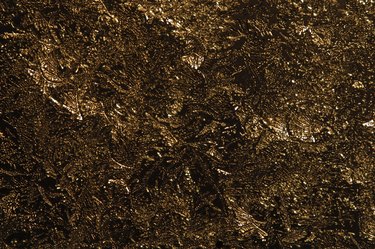
Soil composition, or the amount and types of minerals in any soil, is determined by multiple factors. The type of rock the soil originated from, topographic features of an area, climate, time and human activity are the five major factors that affect soil composition. Soil composition and quality can be changed and improved with human efforts, but it may take a long time.
Parent Rock
Video of the Day
All soil originated from some type of rock, called the parent rock. Soil characteristics are determined by the parent rock's chemical makeup. For example, granite parent rock will produce soil with high aluminum and sodium content, while limestone parent rock will produce calcium-rich soil. Parent rock affects not only the chemical makeup of soil, but its pH as well, making the soil acidic, neutral or basic. Whether a parent rock is hard or soft, along with its shape, will affect the size and shape of grains of inorganic material in soil.
Video of the Day
Topography
Topography, or the physical features of a geographic area, also affects soil composition. When erosion due to water or wind occurs on a steep slope, small grains of inorganic material will slide downward into a flatter area while larger grains will remain. When erosion occurs, soil does not have time to develop from the parent rock, so erosion at the base of a slope is often highest, resulting in coarse, undeveloped soil. Finer soil is usually located further from the base of a mountain because it is able to travel further. Overall, erosion moves small molecules of rock into new locations, thus altering the soil's profile.
Climate
Climate affects erosion, as described above. But it also determines the type of vegetation in an area, which affects the level and types of organic matter in a soil. In deserts with little vegetation, soil has limited organic material in its composition. Because there is little precipitation in these areas, erosion and weathering does not occur, which leads to coarse, sandy soils. In contrast, rain forest areas, where warmth and moisture produce substantial bacteria, leaves and other vegetation are broken down more quickly and absorbed into the soil. Rain, however, causes organic materials to leach out quickly so trees have to work fast to get nutrients. The types of insects and animals that thrive in certain climates also affect the soil's composition: their waste as well as their remains add organic material to the soil.
Time
In some ways, time is the greatest factor in determining soil composition: Soil can take anywhere from two years to thousands of years to form, depending on any of the factors above and the kind of rock at hand. If the climate or weather changes and soil begins to erode quickly, this will change soil composition. As soil changes, the organisms that live there change, too. In other words, soil constantly evolves over time.
Human Practices
Human activities have a huge impact on soil composition. As we dig up soil and move it in order to build, we alter the soil's composition by relocating certain types of soil. On a smaller level, adding organic materials to soil can improve it and make it more nutritious for vegetation. Even farming, which involves watering or fertilizing land that has not experienced this before, changes the soil. The use and overuse of fertilizers and pesticides, as well as the removal of vegetation, can drastically affect soil for the worse.